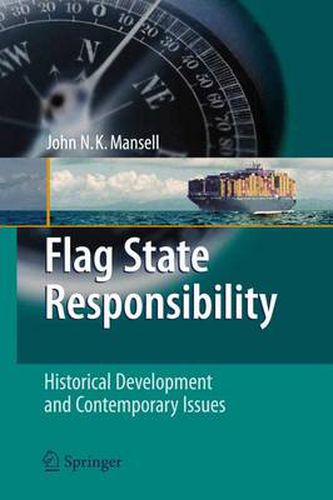Readings Newsletter
Become a Readings Member to make your shopping experience even easier.
Sign in or sign up for free!
You’re not far away from qualifying for FREE standard shipping within Australia
You’ve qualified for FREE standard shipping within Australia
The cart is loading…






This title is printed to order. This book may have been self-published. If so, we cannot guarantee the quality of the content. In the main most books will have gone through the editing process however some may not. We therefore suggest that you be aware of this before ordering this book. If in doubt check either the author or publisher’s details as we are unable to accept any returns unless they are faulty. Please contact us if you have any questions.
All of these flag States have the right to sail ships flying their flag on the high seas (LOSC Article 90) ; and those ships enjo y the freedom of navigation upon the high seas (LOSC Article 87) . W ith this freedom comes a concomitant duty upon the flag State to effectively exercise its jurisdiction and control in administrative , technical , social (LOSC Article 94 (1)) and en vironmental protection (LOSC Article 217) matters over ships flying its flag. 1.2 Flag State Responsibility The absence of any authority over ships sailing the high seas would lead to chaos. One of the essential adjuncts to the principle of freedom of the seas is that a ship must fly the flag of a single State and that it is subject to the jurisdiction of that State. (Brown 1994 , p. 287) This opinion of the International Law Commission in 1956 on a draft article of the High Seas Convention (HSC) was a product of its time; a time of traditional maritime States and responsible long-established shipping companies operating for 3 the most part under the effective maritime administrations of their national flag .
$9.00 standard shipping within Australia
FREE standard shipping within Australia for orders over $100.00
Express & International shipping calculated at checkout
This title is printed to order. This book may have been self-published. If so, we cannot guarantee the quality of the content. In the main most books will have gone through the editing process however some may not. We therefore suggest that you be aware of this before ordering this book. If in doubt check either the author or publisher’s details as we are unable to accept any returns unless they are faulty. Please contact us if you have any questions.
All of these flag States have the right to sail ships flying their flag on the high seas (LOSC Article 90) ; and those ships enjo y the freedom of navigation upon the high seas (LOSC Article 87) . W ith this freedom comes a concomitant duty upon the flag State to effectively exercise its jurisdiction and control in administrative , technical , social (LOSC Article 94 (1)) and en vironmental protection (LOSC Article 217) matters over ships flying its flag. 1.2 Flag State Responsibility The absence of any authority over ships sailing the high seas would lead to chaos. One of the essential adjuncts to the principle of freedom of the seas is that a ship must fly the flag of a single State and that it is subject to the jurisdiction of that State. (Brown 1994 , p. 287) This opinion of the International Law Commission in 1956 on a draft article of the High Seas Convention (HSC) was a product of its time; a time of traditional maritime States and responsible long-established shipping companies operating for 3 the most part under the effective maritime administrations of their national flag .